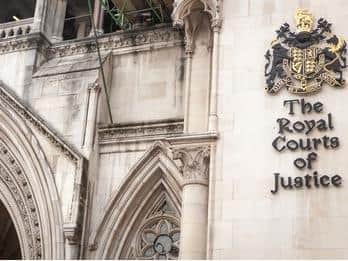Disabled Milton Keynes man fights benefits case in High Court on behalf of 2 million claimants in the UK
and live on Freeview channel 276
A disabled man from Milton Keynes is to make history with a judicial review in the High Court that could help two million other benefit claimants in the UK win a backdated amount of cash.
Ian Barrow is one of four people nationally to challenge the decision of the government not to give legacy benefit claimants an extra £20 to help them during the Covid pandemic.
Advertisement
Hide AdAdvertisement
Hide AdAll Universal Credit claimants were given the weekly 'uplift' but those on legacy benefits received nothing extra.


Legacy benefits are Income-based Jobseekers Allowance, Income-related Employment and Support Allowance, Income Support, Housing Benefit, Child Tax Credit and Working Tax Credit.
Ian is represented by Osbornes Law and their spokesman said the case could make a "dramatic difference" to everybody who claims legacy benefits.
If they win the case, it would mean all fellow claimants would have to be awarded £20 a week backdated for months and months.
Advertisement
Hide AdAdvertisement
Hide AdThe hearing had been listed in the High Court for 28 and 29 September but could not go ahead because a judge was no available to take it. It is now hoped it will go ahead before the end of the year.
Ian said: "I am doing this for all the disabled people and vulnerable people on legacy benefits being discriminated against by the DWP.
"I don’t know how many people in MK this affects but we all should know. I have questioned Ben Everit twice and no direct answer from him," he added.
Ian and his fellow claimant won the first round of their battle in April, when the High Court granted claimants of Employment Support Allowance permission to challenge the DWP’s decision.
Advertisement
Hide AdAdvertisement
Hide AdHe claims he was unlawfully discriminated against as a disabled people contrary to the European Convention on Human Rights.
He is in receipt of Jobseekers Allowance and has been assessed as having limited capability for work-related activity (LCWRA).
At the beginning of the pandemic the Chancellor announced the £20 per week increase to the standard allowance of Universal Credit, but this increase was never extended to those on legacy benefits, the majority of whom are disabled, sick or carers.
A spokesman for Osbornes said the legal argument is that this action is discriminatory and unjustified. The High Court has agreed it is arguably unlawful and will decide the case later this year. The claimants have asked for the trial to be heard before the end of July 2021.
Advertisement
Hide AdAdvertisement
Hide Ad"Despite them having an equivalent entitlement to the ‘standard allowance’ of UC, simply because they were in a different part of the system, 1.9 million people on Employment and Support Allowance (ESA) have been without this increase, which many have called a ‘lifeline’... Claimants of Income Support and Job Seekers Allowance have also been excluded."
Universal Credit is slowly replacing ‘legacy benefits’ but the process will not be complete until 2024 at the earliest. Meantime, those on legacy benefits face the same financial pressures as those on UC, and yet the DWP has decided not to treat them in the same way.
Ian's solicitor William Ford said: “We are pursuing this legal challenge based on the proposition that the pandemic means those dependent upon basic allowances are facing higher basic living costs, and yet despite their very similar circumstances, only some of them receive a Covid-specific uplift to help meet those costs.
"This unfairness calls for a properly evidenced justification, particularly as almost two million disabled people are disproportionately affected by this decision and the pandemic generally. Thus far the Government has failed to provide any objectively verifiable reason for the difference in treatment of people in essentially identical circumstances.”